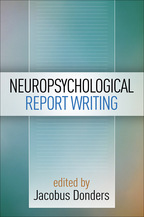Neuropsychological Report Writing
Edited by Jacobus Donders
HardcoverPaperbacke-bookprint + e-book
Hardcover
orderFebruary 22, 2016
ISBN 9781462524259
Price: $71.00 265 Pages
Size: 6" x 9"
Paperback
orderFebruary 23, 2016
ISBN 9781462524174
Price: $47.00265 Pages
Size: 6" x 9"
“The authors have done an admirable job of putting into words some of the more difficult concepts about report writing that a clinician might know, but not be able to articulate to students. This would serve as an excellent resource for trainees across all areas of psychology given the broad applicability of the concepts. Certainly, there are more seasoned clinicians who could further refine their report writing with this book as well. *****!”

—Doody's Review Service
“An invaluable guide for students tackling the difficult task of learning to write outstanding reports that are maximally useful in various practice contexts. There are also enough high-level tips and strategies to make midcareer neuropsychologists want to read this book to sharpen their craft. Engaging and clear, the book addresses not only the mechanics of report writing, but also critical issues of test selection and interpretation and common mistakes. This is not a ‘one-size-fits-all’ approach; rather, the book provides multiple report-writing tools that can be pulled out of the toolkit depending on the audience and purpose of the assessment. This book will undoubtedly become a mainstay in graduate-level neuropsychological assessment courses and a well-used reference for practicing neuropsychologists.”

—Karen Postal, PhD, ABPP-CN, Department of Psychiatry, Harvard Medical School; private practice, Andover, Massachusetts
“Neuropsychologists routinely write reports, yet remarkably little literature exists on the topic. Donders should be commended for so superbly filling the gap. Each chapter is chock full of usable tips and expert advice to make report writing more efficient and consumer friendly. The volume is so rich with actionable information that it promises to be of use not only to students and early-career neuropsychologists, but also to seasoned practitioners.”

—Michael W. Kirkwood, PhD, ABPP-CN, Department of Physical Medicine and Rehabilitation, Children’s Hospital Colorado and University of Colorado School of Medicine
“The editor and contributors achieve their goal of promoting practical and effective clinical reports. Chapters describe specific contexts in which neuropsychologists provide comprehensive assessment services, summarizing the issues that need to be addressed in each situation. The exemplars comparing less desirable and more desirable ways of communicating the same information are very helpful. This volume captures the complexity of neuropsychology practice and provides important insights for emerging and established practitioners.”

—Celiane Rey-Casserly, PhD, ABPP-CN, Director, Center for Neuropsychology, Boston Children’s Hospital
“Donders has gathered an extraordinary group of neuropsychological experts from a wide range of practice settings and patient populations across the lifespan. This essential volume provides thoughtful guidance in the construction of evidence-based clinical neuropsychological reports. In each chapter, readers will find well-reasoned discussions of the crucial variables to be considered. Abundant examples illustrate how to craft the wording of reports to best meet the needs of our patients and others who rely on our assessments to inform decisions and provide appropriate services.”

—John A. Lucas, PhD, ABPP-CN, Department of Psychology, Mayo Clinic Florida
—Doody's Review Service
“An invaluable guide for students tackling the difficult task of learning to write outstanding reports that are maximally useful in various practice contexts. There are also enough high-level tips and strategies to make midcareer neuropsychologists want to read this book to sharpen their craft. Engaging and clear, the book addresses not only the mechanics of report writing, but also critical issues of test selection and interpretation and common mistakes. This is not a ‘one-size-fits-all’ approach; rather, the book provides multiple report-writing tools that can be pulled out of the toolkit depending on the audience and purpose of the assessment. This book will undoubtedly become a mainstay in graduate-level neuropsychological assessment courses and a well-used reference for practicing neuropsychologists.”
—Karen Postal, PhD, ABPP-CN, Department of Psychiatry, Harvard Medical School; private practice, Andover, Massachusetts
“Neuropsychologists routinely write reports, yet remarkably little literature exists on the topic. Donders should be commended for so superbly filling the gap. Each chapter is chock full of usable tips and expert advice to make report writing more efficient and consumer friendly. The volume is so rich with actionable information that it promises to be of use not only to students and early-career neuropsychologists, but also to seasoned practitioners.”
—Michael W. Kirkwood, PhD, ABPP-CN, Department of Physical Medicine and Rehabilitation, Children’s Hospital Colorado and University of Colorado School of Medicine
“The editor and contributors achieve their goal of promoting practical and effective clinical reports. Chapters describe specific contexts in which neuropsychologists provide comprehensive assessment services, summarizing the issues that need to be addressed in each situation. The exemplars comparing less desirable and more desirable ways of communicating the same information are very helpful. This volume captures the complexity of neuropsychology practice and provides important insights for emerging and established practitioners.”
—Celiane Rey-Casserly, PhD, ABPP-CN, Director, Center for Neuropsychology, Boston Children’s Hospital
“Donders has gathered an extraordinary group of neuropsychological experts from a wide range of practice settings and patient populations across the lifespan. This essential volume provides thoughtful guidance in the construction of evidence-based clinical neuropsychological reports. In each chapter, readers will find well-reasoned discussions of the crucial variables to be considered. Abundant examples illustrate how to craft the wording of reports to best meet the needs of our patients and others who rely on our assessments to inform decisions and provide appropriate services.”
—John A. Lucas, PhD, ABPP-CN, Department of Psychology, Mayo Clinic Florida



